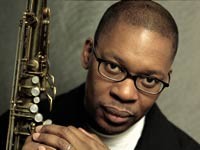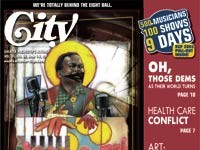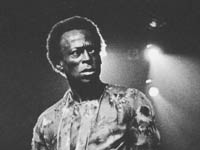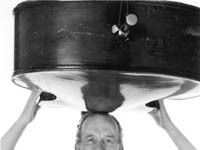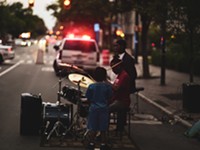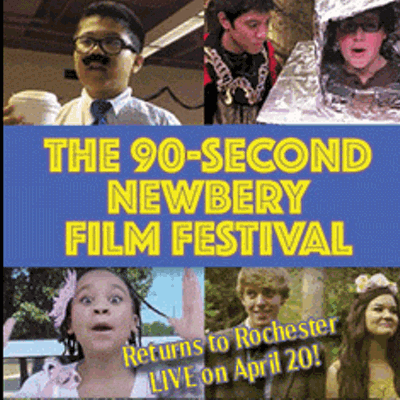[
{
"name": "500x250 Ad",
"insertPoint": "5",
"component": "15667920",
"parentWrapperClass": "",
"requiredCountToDisplay": "1"
}
]
Juana Molina would prefer it if we didn't preview her RIJF appearances. But if we absolutely have to write about them, she hopes we don't feel the need to gush.
"Just say, 'she sucks,'" Molina tells us from her home in Argentina. "That's a feeling I have. Because I don't like too many things. And when I have an extremely good review, I get scared. That leaves too much room for failure."
By now, the Juana Molina Story has been well-documented by the music press: adored Argentinean television comedienne suddenly leaves TV to start recording music that puzzles and disappoints her many fans.
"At the time people just couldn't believe it," she says. "It was like a contradiction, because I was very well-known here. So if I played anywhere, it was sold out in a second. But by the middle of the show there was already no one. It was like a bad joke. For a movie it would be a good scene: a very, very bad live show and then she becomes the greatest star in the world."
Molina's joking, of course. Though she's more comfortable now than she's ever been, musical insecurity is something that's dogged her for years.
She grew up playing guitar in what she describes as "a very musical family." Still, she says, "I had lots of problems with music. I don't know why. I listened to all sorts of music. But when it was time to sing I just could sing in front of my father and my sister, not even my mother."
There was a point in Molina's TV career, though, when she simply couldn't keep going. It was mid-season and she learned she was pregnant. And while she could easily have stuck it out and finished the year, she chucked it all. "I knew something changed my whole way of seeing the world and seeing myself in the world, and I thought 'What are you doing? I am wasting my time. I'm going to be too old. It's going to be too late.' I didn't want to be an old lady saying, 'I could have done that better than her.' I saw that image of me in the future and I said 'Nooooo!' and I stopped everything. Right away."
Even though her mind was made up, even though she was ready to sidestep television stardom to attempt a career in music, she was scared. And it took a while for Molina to achieve the elemental, lovely music heard on 2000's Segundo or her latest, Tres Cosas, which was recorded in 2002 but not released in the US until 2004.
Molina's music stands out mainly because it's so utterly disconnected. Her tuneful songs --- typically created with acoustic guitar, electronic keyboards, and Molina's ethereal Spanish vocals --- reveal no discernable influences. They sound magically naïve, untouched by all the noise of the world. Stateside fans who don't speak a lick of Spanish often talk about how Molina's schoolyard cadences stick with them despite the language barrier.
Her first release, 1996's Rara, is her only album with a band and a producer. And it's almost wholly deficient of the rare beauty she's shown since.
Ultimately unhappy with Rara and even more discouraged by the live shows that followed, Molina retreated. She bought a computer and started recording demos on her own.
"I slowly started to realize that a demo didn't need to be a demo anymore. A demo could be the record," she says. "And when I realized that, I had a lot of things I already recorded. And I thought: If I like it this way, why do I have to make it in a different way? I started to learn how to record. When you like something and you hear it with virgin ears, you don't even think about the sound."
Purity is something Molina very much aspires to in her music. It's an idea she brings up throughout our interview. But she realizes it doesn't make much sense to be too conscious of it. Quite simply, she says, "I don't want to think."
"I wish I could be like some of these musicians who record on tour. I don't know how they do that," Molina says. "Because I really need some loneliness, I need this spirit of being on my own. It's like getting soaked in the music, so I'm in the middle of it and not outside of it."
Much of the material on Segundo and Tres Cosas was recorded late at night, when sheer exhaustion practically forced Molina to remove her guard. "I could say I was asleep because I was soooo tired," she says. "But I couldn't leave the room. I couldn't stop recording. Because I was making music I'm sure I wouldn't have if I was in my normal state because of all the filters, wondering what people will think."
It's no surprise to hear the Molina's a huge fan of Animal Collective's lush and alien campfire arrangements. "I haven't liked a record that much in many years," she says of the Brooklyn group's Sung Tongs. "I just think it's so free and unique."
Molina would very much like to return to the solitude and sleepy haze that pervades her recordings. But her growing reputation is going to make that difficult. She's coming off a major tour with David Byrne. And New York Times music critic Jon Pareles listed Tres Cosas in his 2004 top 10. The record was even played on a recent episode of The OC.
The Pareles nod and the Byrne tour, she says, made her "someone who's worth hearing" in her native Argentina. "People just couldn't believe that was true. They couldn't believe it. So all last year was: Have you heard about Juana Molina touring with David Byrne? No way!"
People are finally listening. And Molina doesn't mind, too much.
"Now I have this pressure," she says. "Because when I recorded those records, no one knew about me. No one. So it didn't matter. I could do whatever I wanted to do. But now it will be very different. Because everybody's talking. Not everybody, but the people who talk. They already have an opinion. They already have expectations about what I am going to do next."
Molina's new material has actually grown out of the live adaptations she's been performing of her old songs. "I had to change them a little bit so I don't get bored," she says. And she's realized her new arrangements don't have to be limited to her old work.
For her two jazz festival sets, Molina will play new arrangements but she'll stick to the old songs. "If I played the new songs now, when the record is released they will already be old to me," she says. "And when I feel I'm doing something by heart and not with my heart, I get rid of it."
Whatever happens, you get the sense Molina will find some reason to fret.
"I am a worrier," she admits. "But at least I can do it now. I couldn't even do it before. I couldn't play a song in front of anyone. I became totally paralyzed. My hands would start shaking. I'd hit the wrong notes. Everything was wrong. How could people think I was good at anything if I couldn't prove otherwise? I was totally stuck for a long, long, long, long time. I'm happy that it finally happened. I would have died without this. I could have died doing my stupid characters, going on and on and on forever."
Juana Molina plays at Max of Eastman Place, 387 East Main Street, on Saturday, June 11, at 6:15 and 10 p.m., as part of the Rochester International Jazz Festival. Free with Club Pass. $15 tickets available at the venue, space permitting. www.rochesterjazz.com
In This Guide...
Latest in Rochester International Jazz Festival
More by Chad Oliveiri
-

Fiz - 1.11.06
Jan 11, 2006 -
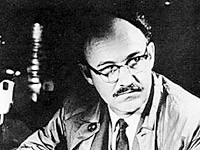
Final cut pro
Nov 16, 2005 -
It’s the economy, stupid
Jul 27, 2005 - More »

